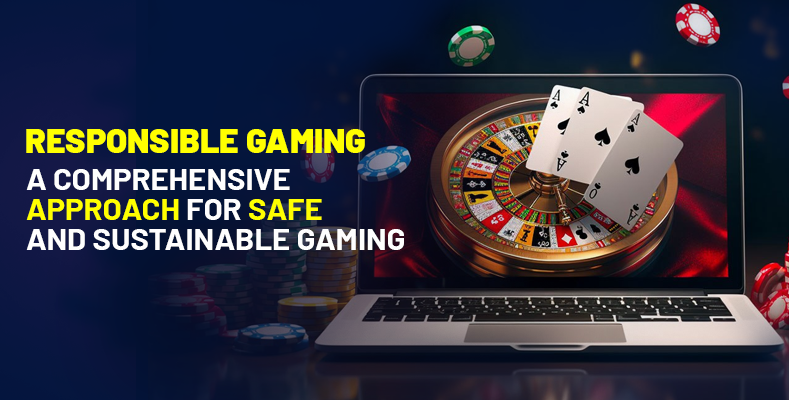Subtotal ₹0.00
Responsible gaming involves a comprehensive approach shared by gambling operators and players to mitigate the potential negative consequences of gambling. This framework is made to create a secure and controlled environment, protect vulnerable individuals, and prevent illicit activities.
The Role of Gambling Operators
Gambling operators bear the primary responsibility for fostering a responsible gaming ecosystem. They must focus on several key areas:
Secure Online Environment
Data Protection: Operators must employ robust security measures to safeguard player data, including personal and financial information. This involves using encryption technologies, firewalls, and safe payment gateways to prevent data breaches.
Platform Integrity: Ensuring the fairness and transparency of gaming platforms is paramount. Independent audits of random number generators (RNGs) are necessary to guarantee the impartiality of game outcomes.
Protection of Vulnerable Gamblers
Identification and Prevention: Operators should use advanced risk assessment tools to identify players showing signs of problem gambling. Monitoring betting patterns, transaction history, and self-exclusion requests is crucial in this regard.
Support Resources: Providing access to responsible gaming tools, such as deposit limits, timeouts, and self-exclusion options, empowers players to control their gambling behavior. Collaborating with problem gambling support organizations is essential for offering comprehensive assistance.
Prevention of Underage Gambling
Age Verification: Rigorous age verification procedures must be in place to prevent underage kids from accessing gambling platforms. This involves using identity verification technologies and conducting document checks.
Parental Controls: Operators should promote parental involvement in safeguarding children from gambling by providing information and resources on parental control tools.
Combating Criminal Activities
Anti-Money Laundering (AML): Adherence to strict AML regulations is crucial to prevent the exploitation of gambling platforms for money laundering purposes. This includes conducting thorough customer due diligence (CDD) and monitoring for suspicious transactions.
Fraud Prevention: Implementing robust fraud prevention measures, such as identity verification and transaction monitoring, protects both operators and players from financial losses and identity theft.
Information Disclosure
Transparency: Operators must provide clear and accessible information about the games offered, including rules, odds, and house edge. This empowers players to make informed decisions.
Responsible Gaming Information: A prominent display of responsible gaming resources and contact information is essential for raising awareness and encouraging help-seeking behavior.
Ethical Marketing
Target Audience: Advertising and marketing materials must not target minors or vulnerable individuals.
Truthful Representation: Promotional content should accurately reflect the gambling experience, avoiding misleading or deceptive claims.
The Role of Players
While operators play a crucial role in promoting responsible gaming, individuals also bear responsibility for their gambling behavior. Key strategies for players include:
Setting Limits
Establishing financial and time limits before engaging in gambling helps prevent excessive spending and time consumption.
Prioritizing Responsibilities
Gambling should be considered a form of entertainment and not a means of income. Prioritizing financial obligations and personal commitments is essential.
Seeking Support
If gambling becomes problematic, seeking help from support organizations or counseling services is crucial.
Detailed Framework for Safe and Sustainable Gambling
Responsible gaming encapsulates the collective duty of gambling operators and players to minimize gambling-related harm. This comprehensive framework emphasizes creating a controlled environment, protecting vulnerable individuals, and averting illegal activities.
The Role of Gambling Operators
Operators are at the forefront of nurturing a responsible gaming culture. Their responsibilities are multifaceted:
Ensuring a Secure Online Environment
Data Protection: Implementing stringent security measures is essential to protect player data. Encryption technologies, firewalls, and secure payment gateways play pivotal roles in safeguarding personal and financial information from unauthorized access and breaches.
Platform Integrity: The fairness and transparency of gaming platforms must be upheld. Regular independent audits of RNGs ensure unbiased game outcomes, fostering trust among players.
Protecting Vulnerable Gamblers
Identification and Prevention: Operators must leverage sophisticated risk assessment tools to detect signs of problem gambling. Monitoring betting patterns, transaction histories, and self-exclusion requests is critical for early identification and intervention.
Support Resources: Providing responsible gaming tools like deposit limits, timeouts, and self-exclusion options enables players to manage their gambling habits. Collaboration with problem gambling support organizations enhances the assistance provided to affected individuals.
Preventing Underage Gambling
Age Verification: Implementing stringent age verification procedures is vital to restrict minors’ access to gambling platforms. This involves advanced identity verification technologies and thorough document checks.
Parental Controls: Operators should advocate for parental involvement in preventing underage gambling by offering information and resources on parental control tools.
Combating Criminal Activities
Anti-Money Laundering (AML): Compliance with AML regulations is critical to preventing money laundering through gambling platforms. This includes rigorous customer due diligence and continuous monitoring of suspicious transactions.
Fraud Prevention: Robust fraud prevention strategies, such as identity verification and transaction monitoring, are necessary to protect both operators and players from financial losses and identity theft.
Ensuring Information Disclosure
Transparency: Operators must offer clear and accessible information about the games they provide, including rules, odds, and house edge.
Responsible Gaming Information: A visible display of responsible gaming resources and contact information is crucial for raising awareness and promoting help-seeking behavior.
Upholding Ethical Marketing
Target Audience: Marketing materials must avoid targeting minors or vulnerable individuals.
Truthful Representation: Advertising should accurately portray the gambling experience, avoiding deceptive or misleading claims.
The Role of Players
Players also play a vital role in maintaining responsible gaming practices. Their responsibilities include:
Setting Personal Limits
Establishing financial and time limits prior to gambling is essential to prevent overspending and excessive time investment.
Prioritizing Responsibilities
Gambling should be viewed as a form of entertainment, not a source of income. Prioritizing financial obligations and personal commitments is fundamental.
Seeking Help
If gambling becomes problematic, players should seek assistance from support organizations or counseling services.
Conclusion
Promoting responsible gaming is a joint effort that necessitates dedication from both gambling operators and players. By adhering to established standards and encouraging responsible practices, the industry can ensure a safer and more sustainable environment for everyone involved. Game Construct offers safe and secure platforms for all operators and distributors to captivate and retain their players by engaging them with online casino games.


